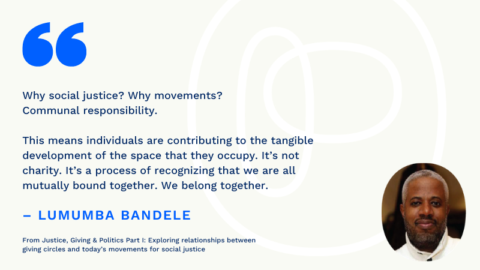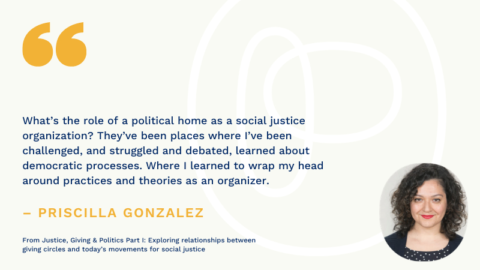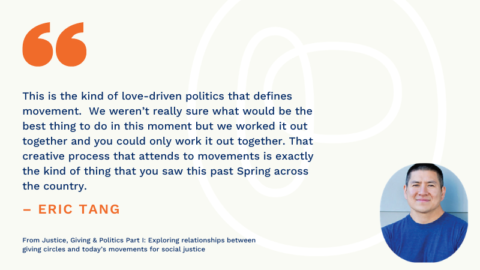What is Giving Compass?
We connect donors to learning resources and ways to support community-led solutions. Learn more about us.
Search our Guide to Good
Start searching for your way to change the world.
What makes giving circles so captivating from a social justice perspective isn’t the money but the intimacy between its members who explicitly want to use their agency to affect change in the world and build relationships to fulfill that desire. — Mario Lugay, Co-chair of the Social Justice Giving Circle Project
Social justice movements are a cornerstone of political activism, bringing people together to liberate and elevate entire communities and upend oppressive systems. The power of these movements rests in the same element that makes giving circles so impactful: The intimacy shared among their members.
The relationships and mutual responsibility that bond a community and drive it to collective action are key to both social justice movements and giving circles. Philanthropy Together, in partnership with the Social Justice Giving Circle Project, launched a two-part webinar series to build a framework for giving circles that want to do more to uphold social justice values, and to be accountable to social justice movement leaders.
The first webinar in the series, Justice, Giving & Politics: Part I, took place in December and brought together five leaders across various social justice movements to lay the groundwork for the discussion:
- Lumumba Bandele, Organizer at Malcolm X Grassroots Movement;
- Priscilla Gonzalez, Campaigns Director at Mijente;
- Joo-Hyun Kang, Director of Communities United for Police Reform;
- Eric Tang, Associate Professor and Associate Chair of African and African Diaspora Studies at UT Austin; and
- Mario Lugay, Senior Innovation Director of Justice Funders, and CEO of Giving Side (Moderator)
More than 100 participants — many who are just beginning their political and philanthropic journeys — joined the conversation to explore how they can impact change through their own activism and financial giving. Participants came away inspired with new ideas about how to influence their communities, start or expand their own giving circles, and take the next step in their political journeys.
Lugay opened the conversation with an activity demonstrating the transformative nature of intimacy and human connection. He asked panelists to identify and thank one person instrumental in their own lives and political journeys. Participants joined in by chat to also thank an influential person in their lives. This grounding exercise set the stage for a powerful discussion between the panelists. Here are highlights from the webinar:
Bandele sparks the conversation by defining communal responsibility as a central tenet of any social justice movement.

Gonzalez explains that a political home, or casita, is a dedicated space within broader movements where we can find refuge.

An organization’s most valuable assets are the people who comprise it. Kang explores how we can learn and transform in every space we're in. From self-reflection (what is the world that I want to live in and how can I start the work of creating it?) to commitment (what contributions am I willing to make to build the world that I want?) to sacrifice (what risks will I take to turn these dreams into reality, to build a world where everyone is free and has their basic needs met?), individuals play a critical role in any movement or social change.

Speakers closed the discussion by touching on another element central to social justice movements and giving circles:. Tang encourages the audience to consider this question: “Are you finding pleasure and joy in collaborating with other people?”

To watch the full webinar recording, visit Philanthropy Together’s YouTube Channel. Part II of this foundational webinar series will feature members and leaders of giving circles who are in relationship with social justice movements.
Categories:
- North America
- Collective Impact